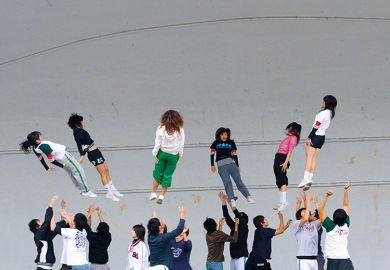Arthur C. Clarke considers whether our spiralling use of internet search engines will trap us in a Big Brother-style society
Editors of dictionaries must be hard put to keep up with the linguistic explosion caused by information technology. At the beginning of the 20th century, the very word "computer" was used exclusively to describe the young ladies who toiled away in census offices using pen and paper or primitive collections of hand-cranked gear wheels.
Computers have introduced words and phrases into our language that would have been utterly meaningless only a few decades ago. Could our grandparents have understood our anguished cry: "My laptop has crashed"? And what would they have made of "megabytes", "hard drives", "back-ups" - or the principal current use of "boot"?
Some words introduced by the informtaion technology industry take amazingly little time to come into wider use. Ten years ago, Google was completely unknown; today there can be hardly any computer user who has not heard the word. Indeed, it is now synonymous with online search and has spawned the verb "to google". I wonder how many of the tens of millions who google know that the world's largest media company - which did not even exist a decade ago - was named after googol: the arithmetical term for the number one followed by 100 zeros.
The Search is the fascinating story of the origin and rapid rise of Google - and the industry that it leads. It is written by the experienced Silicon Valley journalist and co-founder of Wired magazine, John Battelle, and it offers glimpses of how new ideas and technologies are conceived and nurtured in the information age. It is also the story of how Google's co-founders - Sergey Brin and Larry Page - built a billion-dollar company from their campus office at Stanford University.
Although I share an international roll of honour with Brin and Page - the Marconi Fellowship- we have never met. Yet I feel a strong kinship: there cannot be too many others who have sparked off a whole industry almost single-handedly. Exactly 60 years ago, when I invented the communications satellite while still working as a radar instructor in the Royal Air Force, I never expected the idea to become a reality in my lifetime (and did not bother to patent it). Actually, it took only 20 years for the first commercial comsat to be launched, and today these tools of the Space Age are indispensable to our civilisation.
If comsats are an integral part of the nervous system of humankind, Google must provide part of its brain. Of course, it is still in the early stages of evolution under the watchful eye of its founders. But the future could hold any number of different scenarios.
The Search explores some of these, but only time will tell which possibilities will become realities. However, the book is more than the biography of a single company or industry (although it does have interesting titbits on who did what to whom during the heady days of the dot-com bubble). The influence that Google and its rivals - including AltaVista, Lycos and Yahoo! - have on modern life is far-reaching and increasingly pervasive: it straddles the worlds of technology, marketing, finance, media, culture, politics and just about every other area of human interest. Any discussion of search soon becomes a reflection of our times.
Of course, search itself predates our current silicon-enabled versions by a few millennia. As Brewster Kahle, founder of the Internet Archive, says, Google is just our latest attempt to bring the sum total of human knowledge together in one place at one time. As far as we know, the journey started with the library of Alexandria. And as knowledge expanded over time, knowing where and how to look something up moved from being a scholarly attribute to an everyday skill. Searching online arrived just in time to save us from drowning in the deluge of information that we had generated.
During the past decade, search has become a universally understood method of navigating our information universe: much as the Windows interface defined our interactions with the personal computer, search defines our interactions with the internet. And in just a few years it has become a regular activity in our daily lives: some 550 million searches are conducted every day (and this figure grows by 20 per cent every year).
But online search is much more than just an information utility - and that sets it apart from its predecessors such as the Yellow Pages , directories and catalogues. Because it is interactive, globally distributed and used around the clock, online search offers unique insights into that billion-dollar question: what do people want?
This is how Battelle describes it: "Link by link, click by click, search is building possibly the most lasting, ponderous and significant cultural artefact in the history of humankind: the database of intentions... the aggregate results of every search ever entered, every result list ever tendered and every path taken as a result. It lives in many places, but three or four places in particular - AOL, Google, MSN, Yahoo! - hold a massive amount of this data. Taken together, this information represents a real-time history of postweb culture - a massive clickstream database of desires, needs, wants and preferences that can be discovered, subpoenaed, archived, tracked and exploited for all sorts of ends."
That is at once exhilarating and frightening. Google's co-founders insist that their company has no intention of disclosing this data to assorted marketers or inquisitive governments. But Battelle points out the draconian powers the US Government has assumed in the wake of the September 11, 2001 attacks - for example, through the Patriot Act - that are inspiring similar legislation by other governments. In the name of national security and terrorism prevention, law enforcement and intelligence agencies are increasingly keeping tab of e-mails, text messages and other data exchanges. How much longer can search companies keep their promise of confidentiality to users?
"We are one bad story away from being seen as Big Brother," Battelle quotes one Google official as saying. While that would be a public relations nightmare for any search company, there is one big difference: everyone who uses online searches does so voluntarily. It is like Big Brother in reverse - but with potentially the same results.
Meanwhile, on a more productive note, search can accelerate the quest for the Holy Grail of computing: artificial intelligence (AI). Because today's best search engines still fall short of understanding the diversity and variability of what people are looking for, scientists are constantly looking for ways to deliver more precise, meaningful and useful results. In that process, the frontiers of AI are being pushed back all the time. Could this one day lead to the creation of HAL, the computer in 2001: A Space Odyssey ? Or produce an android such as Star Trek' s Data? Or usher in the more sinister possibilities explored by the Matrix trilogy?
At present, there is no way of telling where the road from Alexandria, via Silicon Valley, will eventually take us.
Sir Arthur C. Clarke is a science fiction writer, one of whose stories was an inspiration behind the world wide web, and whose technical paper, published in Wireless World in 1945, outlined the concept of the communications satellite.
The Search: How Google and Its Rivals Rewrote the Rules of Business and Transformed Our Culture
Author - John Battelle
Publisher - Nicholas Brealey
Pages - 311
Price - £16.99
ISBN - 1 85788 361 6
Register to continue
Why register?
- Registration is free and only takes a moment
- Once registered, you can read 3 articles a month
- Sign up for our newsletter
Subscribe
Or subscribe for unlimited access to:
- Unlimited access to news, views, insights & reviews
- Digital editions
- Digital access to THE’s university and college rankings analysis
Already registered or a current subscriber? Login



